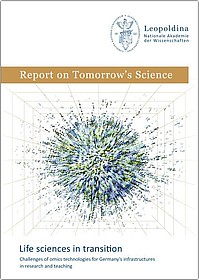National Recommendations
Life sciences in transition (2015)

Report on Tomorrow's Science: Challenges of omics technologies for Germany’s infrastructures in research and teaching
(2015, 42 pages, ISBN: 978-3-8047-3283-4)
At the start of the 21st century, life sciences are undergoing a radical change. Groundbreaking technologies are opening up entirely new possibilities of analysing life processes. Using omics technologies, different biomolecules, for example DNA, RNA, proteins or metabolites, can be detected in living organisms almost in their totality. Based on omics data, life sciences such as molecular biology, biomedicine or health research increasingly aim to obtain a computer-assisted observation of molecular processes and thereby a new understanding of life processes.
The new technologies generate huge quantities of data of which only fragments can be analysed at present. This generates the so-called Big Data problem as the surge in data quantities does not automatically mean a greater knowledge acquisition. The challenge is to extract and analyse information from the wealth of digital data that is relevant to the respective scientific issue. Moreover, the data and the findings derived from this data need to be made available to the scientific community using suitable networks requiring close interdisciplinary collaboration between life sciences and other scientific fields such as informatics, mathematics, physics and engineering.
This Report on Tomorrow’s Science presents a clear diagnosis: Germany is not adequately prepared for the rapid developments in omics technologies, particularly the information technology requirements of these technologies.

Elmar König
Head of Department Science – Policy – Society, Head of Berlin Office
| Phone | 030 203 8997 - 865 |
| Fax | |
| elmar.koenig (at)leopoldina.org |
